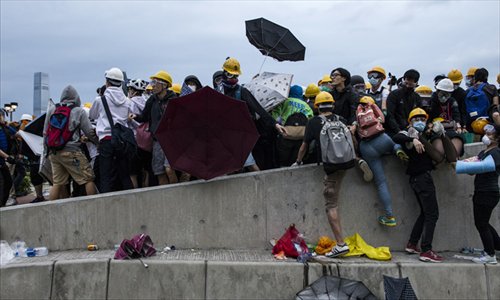Hong Kong protests turn violent
Don’t mistake police tolerance for weakness: Leung

Protesters gather at Tamar, near the government headquarters in Hong Kong's Admiralty district on Monday. Police unleashed pepper spray and baton charges at students who tried to storm Hong Kong's government headquarters early on Monday, as tensions soared in the third month of protests. Photo: AFP
Hong Kong's Occupy protests have become increasingly violent as demonstrators on Monday temporarily shut down government headquarters after clashing with police, a move strongly condemned by the Hong Kong leader, who said such acts cannot be tolerated.
The Occupy protesters escalated their action Sunday night after police cleared protest sites last week. The two main Occupy groups, the student federation and Scholarism, had called for protesters to gather in Admiralty district and block the government headquarters, aiming to paralyze government operations.
Violent clashes between protesters and police broke out. Seventeen police officers were injured after being hit by objects that were thrown by protesters. Forty people were arrested during the clash.
Hong Kong chief executive Leung Chun-ying on Monday strongly condemned the protesters' behavior outside government headquarters and said police will no longer tolerate such action after seeing the Occupy protest lingering and turning more violent.
Leung said police had been tolerant but would now take "resolute action," suggesting that patience may have finally run out.
"Some people have mistaken the police's tolerance for weakness," Leung told reporters. "I call for students who are planning to return to the occupation sites tonight not to do so."
Senior police superintendent Tsui Wai-hung said police officers had found dangerous objects at the protest site, such as iron rods and wooden boards laced with nails and bricks.
Although police had cleared protesters with appropriate force, the government headquarters temporarily suspended work Monday morning while all meetings at the Legislative Council were cancelled as roads leading to the government buildings remained blocked.
"There were several meetings scheduled today and they had to be cancelled. For example, the financial secretary had plans to discuss the current economic situation this morning and there were other meetings that were supposed to tackle the housing policy and legislation," Wong Kwok-hing, a Hong Kong lawmaker, told the Global Times.
Financial Secretary John Tsang Chun-wah said the protests had damaged Hong Kong's international image and hurt investor confidence, adding the city's economic growth could be lower than the government's forecast of 2.2 percent. The territory also reported a slowdown in monthly retail sales.
Analysts believe that the new clash showed a change in strategy among protesters, warning that violent acts could continue.
Leaders of the Occupy movement, however, have admitted that their action of paralyzing the government headquarters was a failure.
"Although we succeeded in paralyzing government operations, the whole action, however, was a failure. Police clearances were carried out soon after protesters occupied several spots. The action had not achieved its goal of pressuring the government," Alex Chow Yong-kang, the secretary-general of the Hong Kong Federation of Students, one of the main Occupy groups, said Monday evening.
Chow said the student federation will discuss further Occupy action with protesters in the next few days.
But legislators worried that clashes between protesters and police will become the new normal.
"Demonstrators have changed their protest ways. At the beginning of the protest, demonstrators only stayed at the protest sites, but it has turned into guerilla warfare. And it is very likely that these kinds of behavior will continue to occur in the future," Starry Lee Wai-king, a Hong Kong legislator, told the Global Times.
Chang Chak-yan, a former political science professor from the Chinese University of Hong Kong, also said the Occupy movement will not end easily as the leaders refuse to give up despite increasing public opinion against them.
"Even if the protest leaders announce a withdrawal, [the Occupy groups and the pan-democratic politicians] will continue to provoke protests using different excuses in the future in order to paralyze government operations," he said.
"If [the central government] thinks that Hong Kong is in chaos, they might impose emergency measures," he said.
The High Court on Monday ordered a temporary injunction on several streets in Admiralty district, including parts of Harcourt Road and Connaught Road, the main roads to the government headquarters.
Agencies contributed to this story